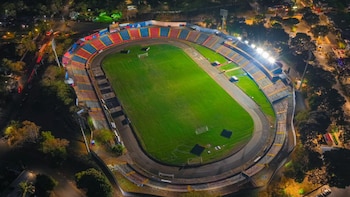
(ATR) The future of the International Weightlifting Federation will follow a route of good governance, says secretary general Mohammed Jaloud.
The Iraqi sports leader says the Federation is now working towards a Congress next March where reforms and other changes will be put to a vote, including elections for the Federation leadership.
Jaloud has more on the status of the changes ahead for the IWF in this Q & A.
ATR: What is the status of plans to reform the governance of the IWF?
Jaloud: Good governance is something that was spoken about at the IWF in the past but not properly applied. The situation now is completely different. There is a clear ambition to ensure that weightlifting’s future is well governed. That’s why we have appointed independent legal experts to the IWF Reform and Governance Commission, so we can build the right path towards the future.
ATR: What message does IWF have for the IOC as it considers weightlifting's status
for the 2024 Olympics?
Jaloud: I know we can address the IOC’s current concerns, just as we did following the
Beijing and London retests by reforming our anti-doping work. We are taking the
same approach to governance that was successful for anti-doping: putting
ourselves in the hands of the independent experts.
ATR: How is the IWF approach to anti-doping changing?
Jaloud: Clearly this has been a historical challenge for the IWF. Working hard with the ITA as an independent partner has been a big part of the answer. Which is why we have extended our partnership with them for four more years, giving authority to them and the Anti-Doping Division of CAS. ITA can help us with more effective testing, and the educational programs we need to continue to change the culture of weightlifting. There are still some coaches and weightlifters with whom we can do more to show them that they should depend on science instead of doping, in order to protect their health and dignity. As an independent body, the ITA is trusted around the world and athletes do listen to their advisors.
ATR: How do programs such as #iLift Clean help?
Jaloud: #iLiftClean was a great example of event-based outreach and we were honoured to see it form part of the activities shown by WADA at its annual Symposium. It’s important for clean athletes at our key events to know justhow important they are to us. It’s also important that this programme is part of a wider approach that follows recommendations from the ITA and its experts.
ATR: What about getting more involvment by athletes in the governance of IWF?
Jaloud: The IWF needs to follow the IOC guidelines by ensuring elections for athlete representatives, which is a much better model than appointment by the IWF President or Secretary General. Good governance demands that we ensure our athletes have the opportunity to choose their own representatives.
ATR: What is the role of the IWF in setting standards for the national associations to follow?
Jaloud: Like any international federation, it’s important that the IWF provides a good example for its members. We need to set the right direction to follow, in order to retain our Olympic status and also maintain strength training as a vital tool for all.
ATR: How have virtual tournaments been operating for the IWF? Are they successful?
Jaloud: Long before the advent of the internet, there were postal competitions for weightlifting. We are used to finding ways to compete when we can’t be together. Our member federations quickly moved to online competitions when the first lockdowns of the pandemic were put in place. They have been very successful in providing opportunities and maintaining motivation.
Recently, we had the first virtual IWF Youth World Cup. We are so grateful to the Peruvian Weightlifting Federation and the Pan-American Weightlifting Federation for their cooperation and support in making it a success for the more than 400 weightlifters from 62 countries who took part. It was an amazing championship. With this kind of competition, we have been able to keep our sport active until the situation with the pandemic returns to normal and with as little negative impact from the coronavirus as possible.
ATR: How important is the IWF to the athletes? How does IWF help athletes compete?
Jaloud: Traditionally, we are the reason weightlifters can go from one gym to another and find barbells and weights of the same size, platforms of similar dimensions. As they move up through the sport, their engagement with our work will grow through exposure to coaching methodologies until finally they reach our competitions.
As an international federation, the IWF has concentrated on a role where we have brought the member federations together, we have assisted their development, we have ensured competitions and coaching of a high standard and we have delivered anti-doping programmes. It is vital for any sport that all these things are done effectively. And even now, we are adding to our work to do more for our athletes. A good example of this is the safeguarding policy we have adopted in order to make sure weightlifters are protected from harassment and abuse.
Últimas Noticias
Utah’s Olympic venues an integral part of the equation as Salt Lake City seeks a Winter Games encore
Utah Olympic Legacy Foundation chief of sport development Luke Bodensteiner says there is a “real urgency to make this happen in 2030”. He discusses the mission of the non-profit organization, the legacy from the 2002 Winter Games and future ambitions.

IOC president tells Olympic Movement “we will again have safe and secure Olympic Games” in Beijing
Thomas Bach, in an open letter on Friday, also thanked stakeholders for their “unprecedented” efforts to make Tokyo 2020 a success despite the pandemic.

Boxing’s place in the Olympics remains in peril as IOC still unhappy with the state of AIBA’s reform efforts
The IOC says issues concerning governance, finance, and refereeing and judging must be sorted out to its satisfaction. AIBA says it’s confident that will happen and the federation will be reinstated.

IOC president details Olympic community efforts to get Afghans out of danger after Taliban return to power
Thomas Bach says the Afghanistan NOC remains under IOC recognition, noting that the current leadership was democratically elected in 2019. But he says the IOC will be monitoring what happens in the future. The story had been revealed on August 31 in an article by Miguel Hernandez in Around the Rings

North Korea suspended by IOC for failing to participate in Tokyo though its athletes could still take part in Beijing 2022
Playbooks for Beijing 2022 will ”most likely” be released in October, according to IOC President Thomas Bach.




